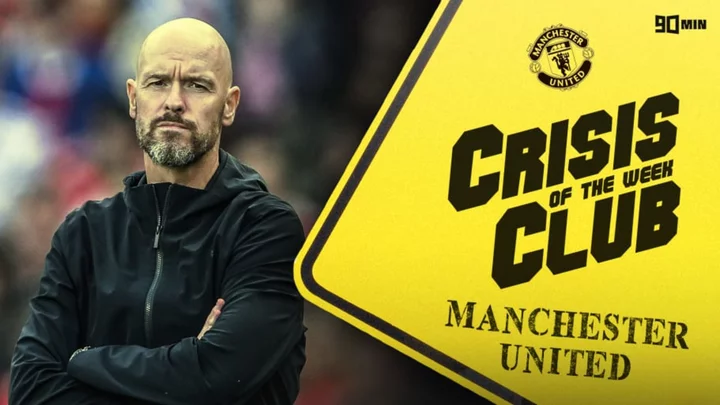
Ukraine war: Russian 'evil cannot be trusted', Zelensky tells UN
The world must unite to end Russia's aggression, Ukraine's president tells the UN General Assembly.
2023-09-20 04:53

3 Chicago Cubs playing their way off the postseason roster
With the Chicago Cubs on the brink of an epic regular season collapse, these three players might not make the postseason roster should the team avoid disaster.
2023-09-20 03:28

Somerset WWII memorial service remembers Canadian aircrew
The memorial remembers five men who were on a Canadian Wellington Bomber that crashed in Broomfield.
2023-09-20 02:58

10 WR sleepers to target for fantasy football Week 3
These 10 wide receivers are worth targeting in fantasy football leagues for Week 3 if your team is in need of some points.
2023-09-20 02:54

FTX sues Sam Bankman-Fried's parents
Bankrupt crypto exchange FTX is suing founder Sam Bankman-Fried's parents, accusing them of siphoning millions of dollars in company funds to enrich themselves and their "pet causes."
2023-09-20 02:17

Darren Waller Q&A: On Getting Traded From the Raiders, Daniel Jones, Brian Daboll, And Icy Hot
Darren Waller touches on a variety of topics.
2023-09-20 01:56

18 Surprising Facts About ‘Halloween III: Season of the Witch’
The controversial sci-fi horror film wasn’t a hit with critics or fans in 1982, but “Halloween III: Season of the Witch” has morphed into a cult classic over the years.
2023-09-20 00:25

Premier League crisis club of the week 2023/24: Manchester United
90min's Premier League crisis club of the week is Manchester United after their defeat to Brighton at the weekend.
2023-09-20 00:19

Erik ten Hag dealt further injury blow as Man Utd name squad for Bayern trip
Man Utd are dealt another injury blow as Harry Maguire is ruled out of the game against Bayern Munich. Mason Mount and Raphael Varane have returned to training but neither are in contention to face the Bundesliga giants.
2023-09-20 00:00

Placenta abnormalities could be the reason for miscarriages, study suggests
A new study has found that placenta abnormalities could be the reason for miscarriages. In the United States, there are approximately 5 million pregnancies per year with 1 million ending in a miscarriage and over 20,000 ending in stillbirth, according to a paper published in the journal Reproductive Sciences. “To have a pregnancy loss is a tragedy. To be told there is no explanation adds tremendous pain for these loss families,” said senior author of the paper and research scientist at Yale School of Medicine, Dr Harvey Kliman “Our goal was to expand the current classification systems to decrease the number of cases that remained unspecified.” For the study, researchers worked to create a classification system for miscarriages based on a test that examines a sample of the body’s tissues – known as pathologic examination. The team looked at a series of 1,527 single-child pregnancies that ended in miscarriage, and the data was then sent to Yale for evaluation. After excluding cases without adequate material for examination, 1,256 placentas from 922 patients were examined. Of these, 70 per cent were miscarriages and 30 per cent were stillbirths. By adding the explicit categories of “placenta with abnormal development” (dysmorphic placentas) and “small placenta” (a placenta less than the 10th percentile for gestational age) to other incidents such as cord accident, abruption, thrombotic, and infection – researchers were able to determine the results of 91.6 per cent of the pregnancies, including 88.5 per cent of the miscarriages and 98.7 per cent of the stillbirths. The most common results for unexplained miscarriages were dysmorphic placentas (placenta with abnormal development) which was around 86.2 per cent. For stillbirths, there was 33.9 per cent due to a small placenta. “This work suggests that the over 7,000 small placentas per year associated with stillbirths could have been detected in utero — flagging those pregnancies as high risk prior to the loss,” said Dr Kliman. “Likewise, the identification of dysmorphic placentas may be one way to potentially identify genetic abnormalities in the almost 1 million miscarriages that occur in our country every year.” He said having a definite explanation “for a pregnancy loss helps the family understand that their loss was not their fault, allows them to start the healing process, and, when possible, prevent similar losses — especially stillbirths — from occurring in the future.” When asked what the most effective way might be to prevent stillbirths, Dr Kliman responded, “Measure the placenta!” Read More 'Please, keep beating little heart': Man gives raw account of wife's miscarriage and fears for new unborn child Woman who had six miscarriages celebrates pregnancy with rainbow baby photoshoot Miscarriage: The loneliest grief of all Nearly a fifth of parents fear children will ignore health issues while at university Brits feel their mental health declining due to cost of living crisis How often should you wash your pyjamas?
2023-09-19 23:56

Nearly a fifth of parents fear children will ignore health issues while at university
Nearly a fifth of parents fear their teenager will ignore a health issue while at university, as many self-diagnose on Google, research has found. Just 13 per cent of the 2,000 parents polled think their son or daughter would consult a proper doctor as soon as they feel unwell. More than one in 10 (12 per cent) think their offspring would be too lazy to seek medical attention, and 11 per cent fear they do not make their health a priority. The study of parents whose children either attend university, have done in the past or plan to soon, by Bupa Family+, also found that many (53 per cent) said their child thinks they are ‘invincible’ and nothing bad will ever happen to them. And as thousands of students prepare to start university, 56 per cent of parents feel excited for their child while 41 per cent are anxious. Dr Naveen Puri, GP and spokesperson for Bupa Family+, which commissioned the research to support the launch of its Family+ insurance proposition built around savings on health insurance for families, said: “All parents worry about their children, whatever their age. “But it can be especially difficult when they move out for the first time and become more independent – and you are no longer nearby to help them. “As a child and even a young adult, when you are unwell or have a health issue, your parents are often your first port of call, or even the ones spotting something is wrong in the first place. “They are usually the ones pointing you in the right direction, sorting appointments and arranging medication you might need. “Moving out or going to university is both an exciting and daunting time for all the family and we hope our new Family+ cover, which also insures older children, will help provide peace of mind to parents and their children alike.” It also emerged that parents’ top fears for their children as they embark on life away from the family home include their financial situation (44 per cent), their mental health (43 per cent), and whether they will be lonely (43 per cent). Others worry about who they will be spending time with (31 per cent), if they’ll know how to look after themselves (32 per cent) and what they’ll do when they feel unwell (23 per cent). And 64 per cent of those who have a child who has already left home admitted they have even lost sleep worrying about them. It emerged that 55 per cent think they would still be the first port of call for help or advice if their child felt unwell despite no longer living under the same roof. Ahead of them moving out, 63 per cent of parents will teach them how to manage their finances, while 59 per cent give tips on how to cook healthy meals. Others show their child how to use a washing machine (56 per cent), how to drink responsibly (40 per cent) and how to deal with mental health concerns (43 per cent). The study, carried out via OnePoll, also revealed girls are considered more likely to take care of their physical (43 per cent) and mental (41 per cent) health than boys (13 per cent and 11 per cent). Dr Naveen Puri, GP and spokesperson for Bupa Family+ said: “Our health is so important, and it can be worrying for parents that their child may be unwell when they aren’t there to help. “Making sure they have the knowledge about what to do in different health situations is a great way of not only ensuring they can look after themselves but also allows you to relax a little knowing they have the tools they need.” Here are the top reasons why parents worry their child would ignore health issues: 1. Googling and self-diagnosing 2. Being too lazy 3. Health is not a priority 4. Embarrassed to talk about their health 5. Worried a GP would judge them Following the findings, Bupa has launched an online survival guide to help students in this next chapter in their lives. Read More ‘It can be hard when your kids leave the nest,’ mother says as study finds parents want their children back How to cope with anxiety during university Brits feel their mental health declining due to cost of living crisis How often should you wash your pyjamas? ‘My baby’s blue eyes drew praise – but their colour was a warning sign’
2023-09-19 23:24

Bill Belichick vs. Bill O'Brien: Patriots at odds over coaching strategy
Bill O'Brien is trying to run an offense for the New England Patriots that doesn't match what head coach Bill Belichick is trying to do.
2023-09-19 22:56
